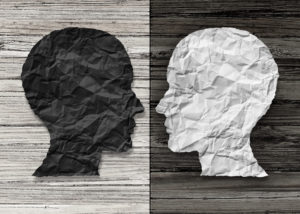Do you struggle with addiction and another mental illness? You’re not alone. Research shows that approximately half of individuals have dual diagnosis conditions.
Treatment that only focuses on substance use is incomplete because recovery entails complete mind-body healing. That means examining and exploring all areas of one’s functioning.
Let’s get into how dual diagnosis treatment works and why it can benefit you.
What Does Dual Diagnosis Mean?
Unfortunately, addition and mental illness can go hand-in-hand. Dual diagnosis refers to the coexistence of a substance addiction along with another mental health issue. While it’s unclear if one condition causes the other, both conditions can exacerbate severe symptoms for the individual.
Common mental illnesses include:
- Depression
- Generalized Anxiety Disorder
- Eating disorders (Anorexia, Bulimia, Binge Eating Disorder)
- Posttraumatic Stress Disorder (PTSD)
- Schizophrenia
- Bipolar Disorder
- Obsessive-Compulsive Disorder
- Attention Deficit-Hyperactivity Disorder (ADHD)
- Borderline Personality Disorder
Furthermore, it’s not uncommon for people to struggle with both a substance addiction and another process addiction, like gambling, compulsive sex, or overspending.
Why Is Dual Diagnosis Treatment Important?
When people choose to become sober, they often focus on getting clean from drugs and alcohol. This thought process makes sense. These substances provide obvious problems in one’s life, and untreated addiction progresses into increased tolerance, cravings, and withdrawal symptoms.
However, a treatment that only focuses on drug and alcohol abuse does not provide comprehensive care for the individual.
For one, mental health conditions are often one of the underlying reasons why people turn to substance use in the first place. The self-medicating effect of drugs and alcohol provides temporary relief for distressing symptoms.
Furthermore, if individuals don’t address their mental health issues, they risk a higher likelihood of relapsing in either their substance use- or in their mental health condition. That’s because they won’t have the adequate coping skills and insight needed to manage the stress and complicated feelings that arise in early recovery.
What Does This Treatment Provide?
Dual diagnosis treatment combines a variety of evidence-based treatment and therapy modalities to:
- help individuals develop positive coping skills
- teach stress reduction techniques
- offer medication evaluating and monitoring
- provide holistic therapies (i.e., yoga, acupuncture, meditation)
- build healthy and sober peer connection
- process and explore relevant traumas
- integrate family and marital support as needed
Modalities and treatment are determined based on the client’s needs and predispositions. When a client enters treatment, his or her treatment team collaborates to design the most effective course of action.
Sometimes, individuals do not realize they struggle with mental health issues until they get sober. They may assume that substance use caused all their problems directly. It’s only when they stop using the drugs or alcohol do they realize that they may be facing other issues.
Trained therapists, psychiatrists, and medical doctors can provide the necessary screening to determine the presence of a dual diagnosis. Your medical team can also work with you to prescribe medications, like antidepressants or antipsychotics, that may help alleviate some symptoms.
What Are The Common Symptoms Associated With Dual Diagnosis?
Just like addiction looks different from person to person, mental illness symptoms can also vary dramatically. Sometimes, it can be difficult to distinguish which symptoms are best explained by the substance use- and which ones are best explained by the mental illness.
That said, common symptoms associated with dual diagnosis include:
- avoidance or lack of grooming and hygiene
- erratic changes in daily behavior
- inability to complete responsibilities or daily tasks
- illogical or irrational thinking patterns
- declining academic or occupational performance
- suicidal attempts or thoughts
- self-harm (cutting, burning, scratching)
- refusal to seek or comply with treatment suggestions
- withdrawal from loved ones
- increased substance use
Any combination of these symptoms may indicate the presence of mental illness. While getting sober will typically provide relief, that alone does not provide a ‘cure’ for another condition.
Instead, individuals will need a comprehensive treatment that allows them to focus on all areas of functioning.
Can You Treat Mental Illness Before or After Getting Sober?
In a short answer, no. Both addiction and mental illness are complicated diseases that don’t have a single remedy.
It’s essentially futile to focus on treating your mental illness while actively using drugs and alcohol. Chronic use of those substances impacts your brain chemistry, which impacts how you respond to the world around you. Because you’re still self-medicating and numbing out most of your feelings, it will be challenging to focus on the root of your mental illness.
It’s also not recommended to put off focusing on treating mental illness after getting sober. While mental health treatment requires long-term care, it’s best to start it at the beginning of your journey.
You want time to understand and reap the benefits of therapy and medication. You also want to have a stable sober foundation to withstand difficult emotions or triggers that you may encounter.
That said, most people benefit from aftercare that includes:
- living in a safe and sober environment
- individual psychotherapy
- group psychotherapy
- ongoing medication evaluations and monitoring
- prosocial peer support
- relapse prevention plans
- emergency resources (i.e. hotlines, follow-up referrals for treatment)
Most treatment facilities also provide alumni services that you can stay in touch with after completing your episode of care.
Final Thoughts
Choosing to seek help can be a challenging decision, but it may be one of the best decisions you ever make. The right treatment for your dual diagnosis can help you live a happy and fully functioning life.
You don’t need to suffer another day. Reach out and speak to one of our compassionate treatment professionals today!
Author
-

President, CEO & Founder at Northbound Treatment Network
Paul Alexander is the CEO, President & Founder of Northbound Treatment Network in Newport Beach, California. He believes wholeheartedly in transformational leadership, organizational health and effective, fully integrated substance use disorder and mental health treatment. With over 27 years of experience in behavioral healthcare, Paul has extensive knowledge of “in vivo” treatment modalities, clinical development, operations, strategy, marketing and financial planning. He has been widely recognized for his development of collegiate-based residential treatment programs for students in recovery and authored a research study at The University of California confirming this modality’s effectiveness.
Paul’s comprehensive professional experience, willingness to innovate, and emphasis on organizational health are vital factors in Northbound’s continued success. Paul received his Certified Addiction Treatment Specialist training at Saddleback College in Mission Viejo, CA, and was awarded Outstanding Alumni Service Award in 2002. Paul holds a Bachelor of Arts degree in Criminology, Law and Society, Summa Cum Laude, from University of California, Irvine, and a Juris Doctorate degree from Loyola Law School of Los Angeles. Paul currently serves on The National Association of Addiction Treatment Providers (NAATP) board. In addition, he serves on The Family Recovery Foundation board and The CarePossible board in Orange County; both organizations are committed to raising funds for family recovery and treatment for former military personnel. Paul is in recovery himself and lives in Orange County with his wife Silvana and his two young sons, Noah and Dean.










